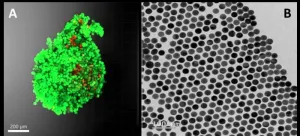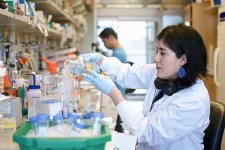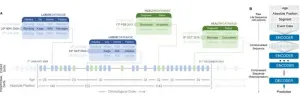Harnessing nanotechnology to understand tumor behavior
Study using SERS technology reveals a new type of interaction between tumor cells and their environment and demonstrates the potential of SERS spectroscopy for cancer metabolism research
2023-12-18
(Press-News.org)
A study conducted by pre-PhD researcher Pablo S. Valera and recently published in PNAS demonstrates the potential of surface-enhanced Raman spectroscopy (SERS) to explore metabolites secreted by cancer cells in cancer research. The study, which has been led by Ikerbasque Research Professors Luis Liz-Marzán (from CIC biomaGUNE) and Arkaitz Carracedo (of CIC bioGUNE) and in which other researchers from both centers, also members of the Networking Biomedical Research Centre (CIBER), have participated as well, provides valuable information to guide more specific experiments to reveal the function of such metabolites secreted in the tumor microenvironment or environment, which could lead to new therapeutic strategies.
The tumor microenvironment is a complex ecosystem formed by interactions between tumor and healthy cells. It is a dynamic pseudoorgan that determines the development and progression of cancers. Although attention has traditionally focused on intercellular communication mediated by protein messengers, attention has recently turned to metabolites (or small compounds) secreted by tumors into the extracellular space.
Traditional techniques for tracking these metabolites in complex cellular contexts are limited, but surface-enhanced Raman spectroscopy (SERS) has emerged as a promising alternative due to its simplicity of operation. In this study, a SERS-based strategy proposes “investigating metabolites secreted by tumor cells lacking methylthioadenosine phosphorylase (a common genetic event associated with poor prognosis in various types of cancer, such as breast cancer and glioblastoma),” explained Valera. SERS “is a spectroscopic technique that uses gold nanoparticles to detect molecules in a biofluid. It is a fairly fast technique, in which no pre-treatment of the samples is required,” he added.
Cellular communication brought about by metabolites secreted by tumor cells
Using SERS, the researchers discovered that these cells secrete purine metabolites, which can be metabolized by healthy cells, giving rise to molecular changes consistent with cancer aggressiveness; this accounts for the reprogramming, which has never been seen previously, of the tumor environment in cancers with methylthioadenosine phosphorylase suppression: “We were able to detect this metabolite, not only in tumor cells but also in the rest of the healthy cells that are in contact with the tumor cells. So we detected that there is a relationship between tumor cells and healthy cells by means of this metabolite, and that it also brings about a change in the behavior of healthy cells so that to a certain extent they help the tumor to develop,” said Valera. It is worth pointing out that, “unravelling the complexity of such interactions in cancer patients could, in turn, pave the way for new therapeutic approaches,” he added.
The successful applying of SERS in this study demonstrates that this technology could speed up the ability to rapidly capture metabolic interactions in complex environments. In fact, the simple, rapid acquisition of signals in SERS, together with its high sensitivity, meets the requirements to be a front-line tool that can subsequently guide more specific analyses. A complete picture of the metabolic status of the tumor microenvironment can be obtained by monitoring with complementary techniques. It is also important to highlight that an effective synergy between SERS and other analytical methods has been demonstrated.
END
[Attachments] See images for this press release:

ELSE PRESS RELEASES FROM THIS DATE:
2023-12-18
Myosteatosis, or aging-related fat accumulation in skeletal muscles, is a leading cause of declines in muscle strength and quality of life in elderly adults.
Older adults who are sedentary and develop accumulated fat in the skeletal muscle are often prescribed exercise by their doctors to combat the condition. If scientists were to develop a new therapy, such as medications, to combat myosteatosis, they would need to replicate the mechanism by which exercise might reduce fat accumulation in muscles.
Fibro-adipogenic ...
2023-12-18
NASA’s James Webb Space Telescope recently trained its sights on unusual and enigmatic Uranus, an ice giant that spins on its side. Webb captured this dynamic world with rings, moons, storms, and other atmospheric features – including a seasonal polar cap. The image expands upon a two-color version released earlier this year, adding additional wavelength coverage for a more detailed look.
With its exquisite sensitivity, Webb captured Uranus’ dim inner and outer rings, including the ...
2023-12-18
How are memories consolidated during sleep? In 2021, researchers led by Dr. Thomas Schreiner, leader of the Emmy Noether junior research group at LMU’s Department of Psychology, had already shown there was a direct relationship between the emergence of certain sleep-related brain activity patterns and the reactivation of memory contents during sleep. However, it was still unclear whether these rhythms are orchestrated by a central pacemaker. So the researchers joined up with scientists from the Max Planck Institute for Human Development in Berlin and the University of Oxford to reanalyze the data. Their results have identified ...
2023-12-18
Zholents was honored for his work on the theory of optical stochastic cooling.
Alexander Zholents, a senior physicist at the U.S. Department of Energy’s (DOE) Argonne National Laboratory and distinguished fellow in the Accelerator Systems division is one of the recipients of this year’s Dieter Möhl Award.
The award is presented by CERN, the European laboratory for particle physics. It is in tribute to the late Dieter Möhl, a pioneer in the realm of particle beam cooling. The awards celebrate both early career and lifetime achievements in the field of beam cooling and its applications.
“I am deeply honored to receive this award,” said Zholents. “The ...
2023-12-18
(Memphis, Tenn.—December 18, 2023) Children with bilateral Wilms tumor have a tumor in each of their kidneys — a condition that strongly suggests an underlying genetic or epigenetic predisposition driving the disease. Scientists at St. Jude Children’s Research Hospital gathered a large cohort of bilateral Wilms tumor samples and conducted analyses to assess which factors contribute to predisposition comprehensively. The work has implications for counseling patient families, guiding treatment decisions and informing the design of future clinical trials. The study was published today in Nature Communications.
Having tumors in ...
2023-12-18
A new study answers a timely question: What is the hardest part of waiting? Consumers do plenty of it—online, in line, in traffic, or for deliveries. And now we know it’s the final phase that’s most problematic for them.
In this season of joyful—and not-so-joyful—anticipation, the research has deep implications for marketers and psychological insights for us all, says Annabelle Roberts, coauthor and assistant professor of marketing at the University of Texas McCombs School of Business. The paper shows:
It’s better for companies to communicate possible delays early in the wait;
It’s better for ...
2023-12-18
ITHACA, N.Y. - A tiny, hard-working bacterium – which weighs one-trillionth of a gram – may soon have a large influence on processing rare earth elements in an eco-friendly way.
In a new study, Cornell University scientists show that genetically engineering this bacterium could improve the efficiency for the purification of elements found in smartphones, computers, electric cars and wind turbines, and could even boost global economic supply chains.
Vibrio natriegens, the bacterium, offers a sustainable ...
2023-12-18
A new study Dec. 18 in Nature reports an AI-driven advance in biotechnology with implications for drug development, disease detection, and environmental monitoring. Scientists at the Institute for Protein Design at the University of Washington School of Medicine used software to create protein molecules that bind with exceptionally high affinity and specificity to a variety of challenging biomarkers, including human hormones. Notably, the scientists achieved the highest interaction strength ever reported between a computer-generated biomolecule and its target.
Senior author David Baker, professor of biochemistry at UW Medicine, ...
2023-12-18
Artificial intelligence developed to model written language can be utilized to predict events in people's lives. A research project from DTU, University of Copenhagen, ITU, and Northeastern University in the US shows that if you use large amounts of data about people's lives and train so-called 'transformer models', which (like ChatGPT) are used to process language, they can systematically organize the data and predict what will happen in a person's life and even estimate the time of death.
In a new scientific article, 'Using Sequences of Life-events to Predict Human Lives', published ...
2023-12-18
December 18, 2023—(BRONX NY)—Neurologists often diagnose Alzheimer’s disease after evaluating patients during lengthy, in-person office visits. This poses a significant challenge for many groups, particularly people with limited access to specialized care, including people from historically marginalized groups and people living in rural areas.
Albert Einstein College of Medicine has received a five-year, $10.9 million grant from the National Institutes of Health (NIH) to study whether remote neuropsychological testing can substitute for in-person office visits when assessing whether people have Alzheimer’s disease or other dementias.
“In-person ...
LAST 30 PRESS RELEASES:
[Press-News.org] Harnessing nanotechnology to understand tumor behavior
Study using SERS technology reveals a new type of interaction between tumor cells and their environment and demonstrates the potential of SERS spectroscopy for cancer metabolism research





